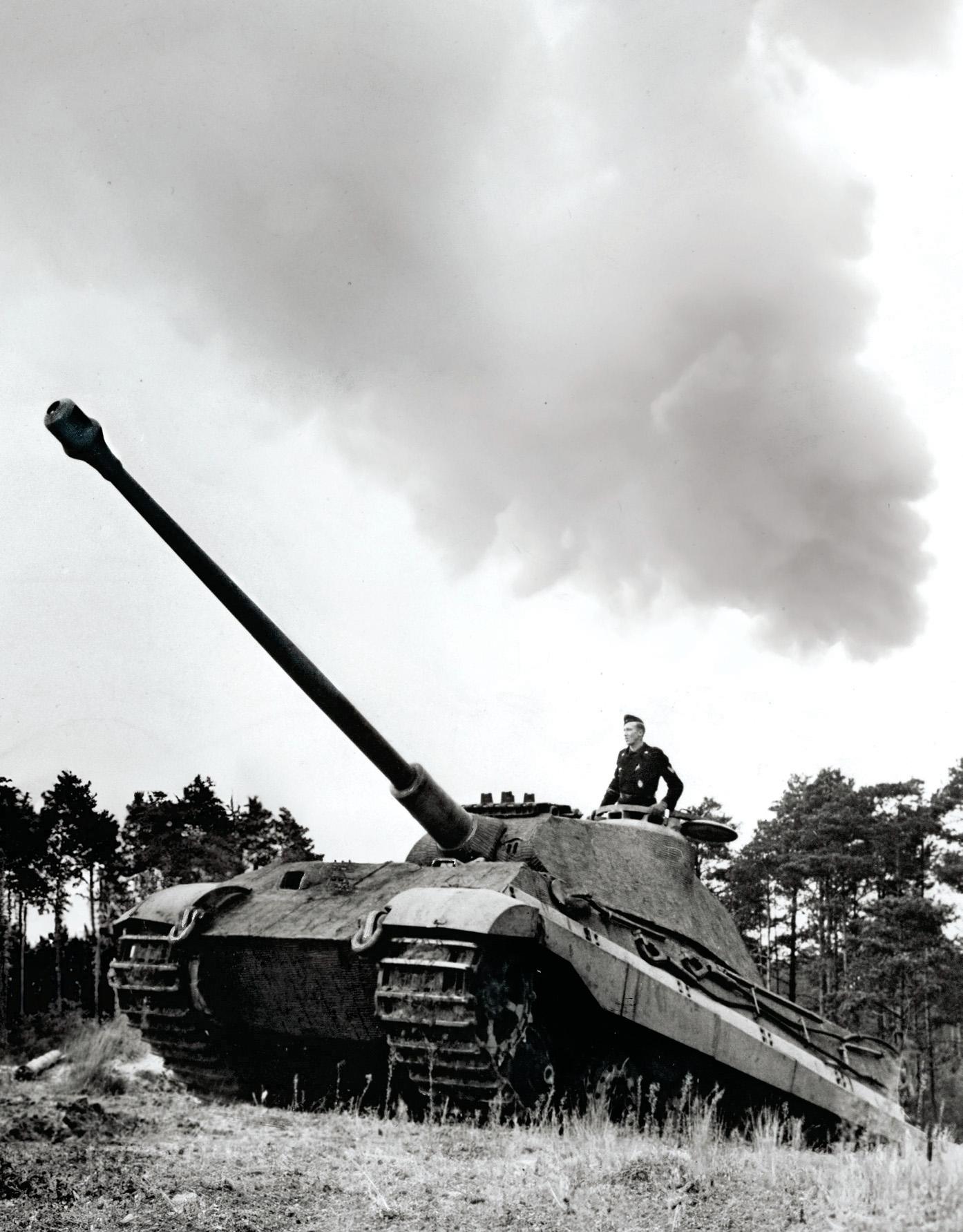Prøve GULL - Gratis
FIERCE BUT FLAWED? KING TIGER
History of War
|Issue 147
The Tiger II was the largest tank used by Nazi Germany in WWII, but the behemoth was problem-prone and never had the impact on the battlefield its creators had sought

The Tiger II was the largest and heaviest operational tank used by Nazi Germany during the Second World War. It was designed to break through enemy lines, smash their defences and knock out their armour with its powerful gun. By 1942, the Soviet Union was proving to be a far harder nut to crack than expected. Something had to be done to turn the tide on the battlefield. The decision? A tougher, larger and more powerful tank. German High Command wanted a deadlier Tiger, armed with a higher-velocity gun capable of penetrating new, thicker Soviet armour at longer distances. Two firms, Porsche and Henschel, were given the task of designing the new hull, while Krupp had the responsibility of creating the turrets for each design.
When the Tiger II engaged in battle with enemy armoured formations it proved to be a formidable opponent, but these occasions were few and far between. In fact, more Tiger II tanks were destroyed by their crews than enemy action. Being extremely heavy, the German Army did not have enough suitable resources to recover them if they broke down because of a mechanical fault, enemy action or they just got stuck in the mud. To prevent their machines from falling into enemy hands and being turned on their former masters, tank crews would often destroy their crippled vehicle before abandoning it.
 Vast resources were required to build just a single Tiger II, and by this stage in the war they were being produced at a time of shortages and heavy Allied bombing of German factories and infrastructure. It has often been said that the Germans should have abandoned these heavy tank projects and concentrated on building greater numbers of Panzer IV tanks, which required far fewer resources to build.
Vast resources were required to build just a single Tiger II, and by this stage in the war they were being produced at a time of shortages and heavy Allied bombing of German factories and infrastructure. It has often been said that the Germans should have abandoned these heavy tank projects and concentrated on building greater numbers of Panzer IV tanks, which required far fewer resources to build.Denne historien er fra Issue 147-utgaven av History of War.
Abonner på Magzter GOLD for å få tilgang til tusenvis av kuraterte premiumhistorier og over 9000 magasiner og aviser.
Allerede abonnent? Logg på
FLERE HISTORIER FRA History of War

History of War
FLYING INTO HISTORY ENOLA GAY
The first atomic bomb was dropped on Japan by an American B-29 bomber, preceding the country's capitulation in WWII. Here navigator Theodore Van Kirk recalls his experience of the day that changed history
7 mins
Issue 149

History of War
PUTIN'S SUBMARINE FLEET
From the Cold War to modern operations, the threat beneath the waves has been steadily building, and could be about to escalate
4 mins
Issue 149

History of War
ON SILVER WINGS
THIS MOVING BIOGRAPHY OF AN 'UNKNOWN' WWII RAF FIGHTER ACE CHARTS DESMOND IBBOTSON'S CAREER, THE STORY ENDING WITH A TWIST WHEN HIS REMAINS ARE DISCOVERED IN ITALY IN 2005
2 mins
Issue 149

History of War
CAMBODIA vs THAILAND ROOTS OF THE BORDER WAR
July 2025's clashes are the latest in a long frontier conflict that has gone unresolved, from the era of warrior kings to smart bombs
4 mins
Issue 149

History of War
TASK FORCE GREMLIN
At the end of WWII the Japanese Imperial Army Air Force was conscripted into the Royal Air Force in Southeast Asia
7 mins
Issue 149

History of War
RAF RETURNS TO NUCLEAR
Nearly 30 years after giving them up, the RAF is poised to reacquire air-dropped nuclear weapons
3 mins
Issue 149

History of War
NO MORE NAPOLEONS
A MAGISTERIAL SURVEY OF NAVAL POWER AND POLICY
2 mins
Issue 149

History of War
STALIN'S BLITZKRIEG
In the final month of WWII, the Red Army launched a devastating strike into Manchuria, opening a new front with Japan and threatening invasion of the Home Islands
10 mins
Issue 149

History of War
BALACLAVA POCKET WATCH
This William IV silver timepiece and its owner survived the Charge of the Light Brigade at the Battle of Balaclava
1 mins
Issue 149

History of War
THE END OF THE SPY?
Human intelligence is a dying art, but it is still crucial for security agencies worldwide
3 mins
Issue 149
Listen
Translate
Change font size
